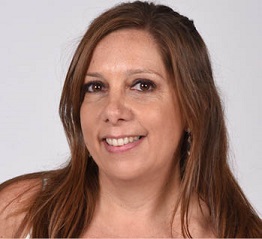Dr Vanesa Bochkezanian
Dr Vanesa Bochkezanian is a lecturer in Neurological Physiotherapy based at CQ University in Queensland, Australia, and has a background as a physiotherapist working in rehabilitation settings in Argentina and Australia.
This research group is a combination of experts in different fields that share a passion to improve the lives of people with spinal cord injury by empowering them with the use of assistive technology. Their “Electrical stimulation-induced exercise is medicine in persons with SCI” workshop proposal at ISCoS 2021 was accepted as an oral presentation. They wish to continue to disseminate their knowledge and expertise by being actively involved in the virtual conference, allowing them to continue their mission to inspire and provide the latest evidence-based information about electrical stimulation to clinicians, researchers and people with SCI worldwide.
Dr Vanesa Bochkezanian and her team received a 2021 SCI Collaboration Grant to attend ISCoS 2021:Virtual. The team comprises:
- Dr Vanesa Bochkezania, Lecturer in Neurological Physiotherapy, Central Queensland University, Australia
- Professor Glen M Davis, Professor of Clinical Exercise Sciences. Director, Clinical Exercise and Rehabilitation Unit. Exercise and Sport Sciences, School of Health Sciences. The University of Sydney, Australia.
- Dr Ashraf Gorge, Chief of Spinal Cord Injury Research, Hunter Holmes McGuire VA Medical Centre, Spinal Cord Injury & Disorders Service, USA
- Dr Nazirah Hasnan, Consultant Rehabilitation Physician, Department of Rehabilitation Medicine, Faculty of Medicine, University of Malaya, Malaysia

L-R: Vanesa Bochkezanian, Glen M Davis, Ashraf Gorgey, Nazirah Hasnan
The research group share their experiences from the conference.
“Attending the 2021 (60th) ISCoS Scientific Annual Meeting virtually funded by the SRI has provided my team and I various benefits. Firstly, it gave the four of us the opportunity to present the oral presentation entitled: “Electrical stimulation-induced Exercise is Medicine in persons with SCI: a storytelling from individuals with lived experience” and strengthen our research collaborations since we started in 2012. As a result of this collaboration, I have been invited by Prof. Glen Davis to be part of IFESS chair to host future RehabWeek scientific meetings which will be held in Australia. Also, Dr Gorgey and his team have invited me to continue to collaborate with research publications, which we have submitted during 2021 and we have also submitted an abstract to present at RehabWeek in 2022. Dr Hasnan also recommended me as a candidate reviewer for WHO Rehabilitation Programme on the development of the Package of Interventions for Rehabilitation for spinal cord injury (SCI).
Secondly, the ISCoS lecture from Dr Catherine Jutzeler and the advances in clinical research using digital twins was extremely interesting and caught my attention, as this seems a plausible and practical model that may eliminate the barrier of having a human control group for randomized controlled trials. Also, the Plenary Anthony DiMarco presented by Dr Jane Butler entitled: “Neural control of respiratory muscles and methods to improve their function” was extremely insightful into the different methods and very significant results obtained after the use of electrical stimulation in the respiratory muscles in people with tetraplegia.
Thirdly, the following workshops “Knowledge translation in spinal cord injury (SCI) research: gaps and bridge”; “Building capacity for engaged research: the new integrated knowledge translation (IKT) guiding principles for conducting and disseminating SCI research in partnership”; “Establishing consumer engagement programs and the impact for SCI research organizations” were extremely useful and provided many insights on how to generate person-centred research from inception in closed collaboration with stakeholders. I am extremely committed and interested in continuing developing the necessary steps towards building a research culture that applies the principles from consumer engagement program and the IKT guiding principles, as I believe this is the best way to move forward into closing the gap between research and practical applications that directly benefit people with SCI.
Finally, the highlight of the Conference was using the Gather Town app to mimic what our social interactions would look like in a face-to-face meeting. There were many interesting conversations exchanged with SRI staff, as well as other clinicians and advocates of consumer engagement (John Chernesky) that were quite memorable. However, I must admit that I am looking forward to dancing on a real dancefloor with a DJ in the next ISCoS!
In conclusion, the SRI travel grant has provided my team and I with the immense opportunity to not only continue our collaboration with each other, be up-to-date with the latest research in the SCI area, collaborate and discuss ideas with other international researchers and learn about the processes of community engagement in the research process, but have also provided my team and I with tangible opportunities to advance our careers, which will hopefully have a valuable and positive impact on those living with a spinal cord injury.”

